牛津译林版英语八年级上Unit 8 Natural disasters语言要点和语法拓展课件(39张PPT)
文档属性
| 名称 | 牛津译林版英语八年级上Unit 8 Natural disasters语言要点和语法拓展课件(39张PPT) |

|
|
| 格式 | zip | ||
| 文件大小 | 135.3KB | ||
| 资源类型 | 教案 | ||
| 版本资源 | 牛津译林版 | ||
| 科目 | 英语 | ||
| 更新时间 | 2020-05-14 00:00:00 | ||
图片预览

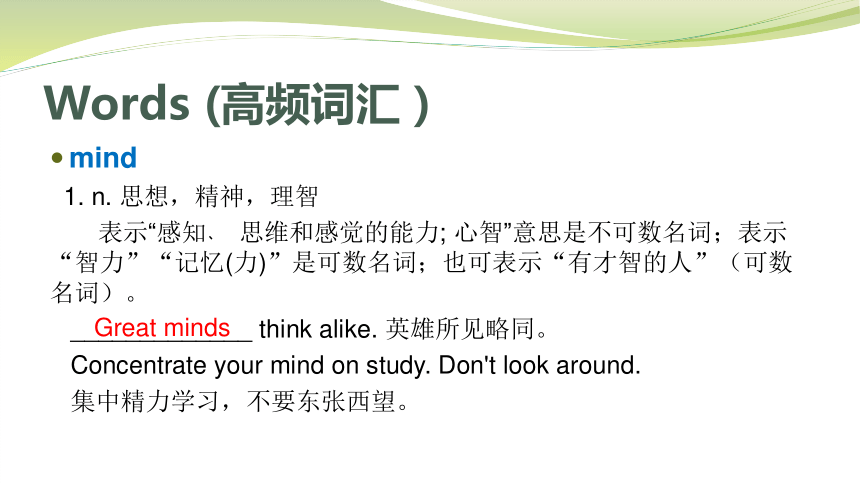
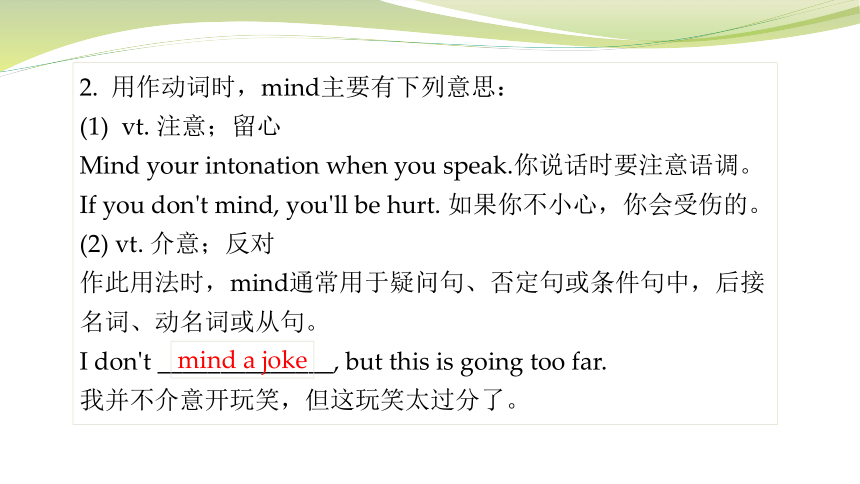
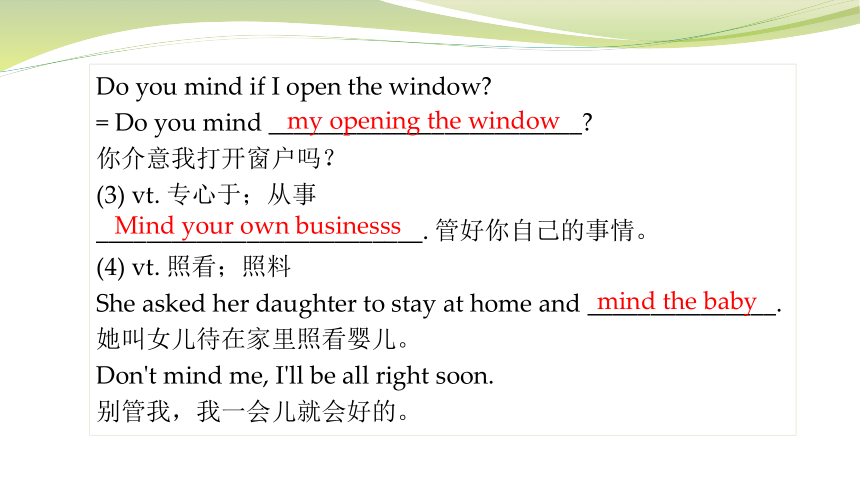
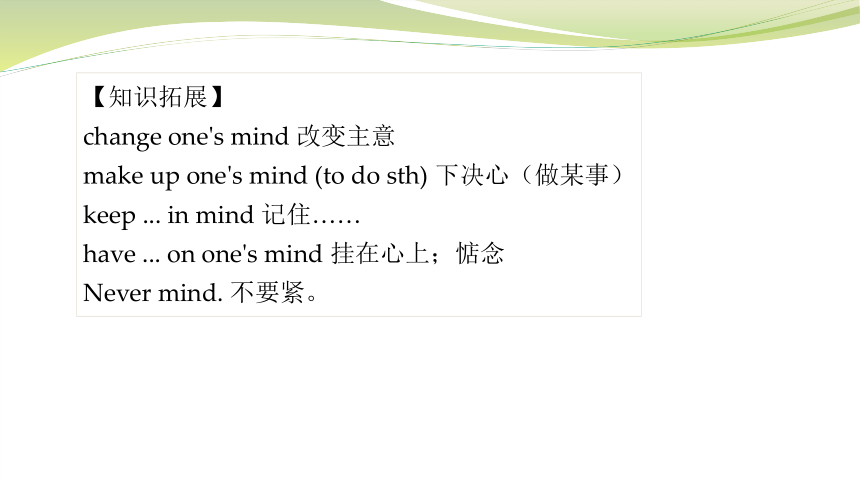
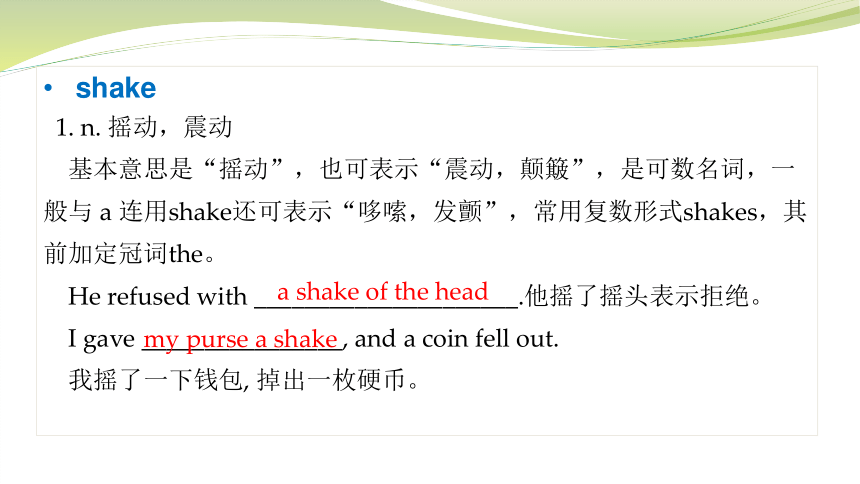
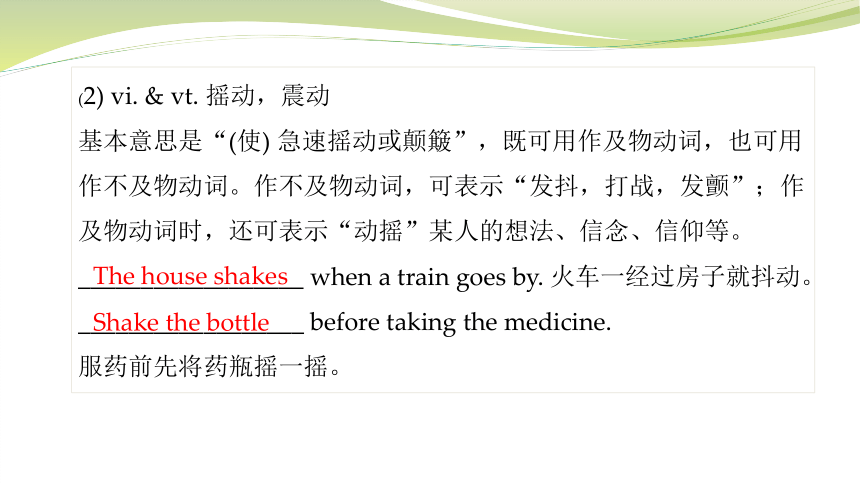
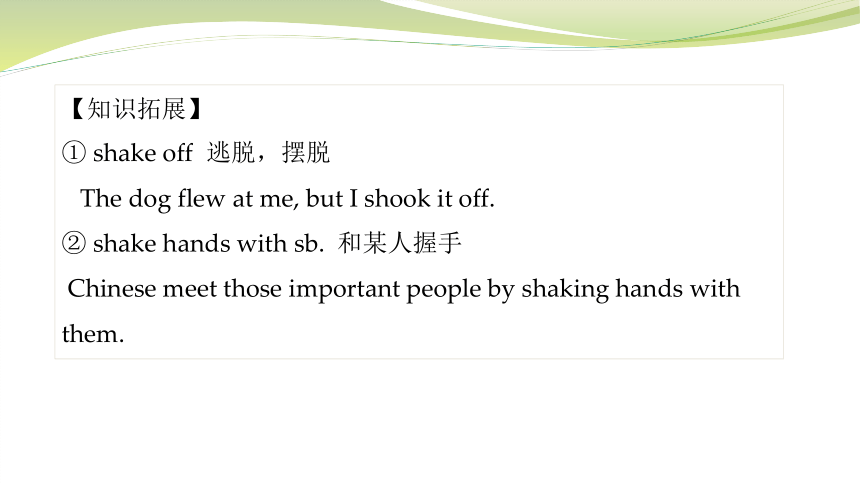
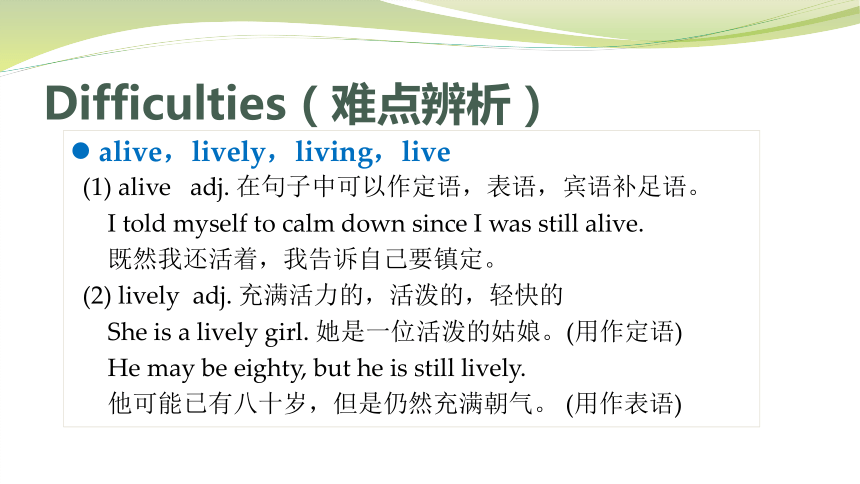
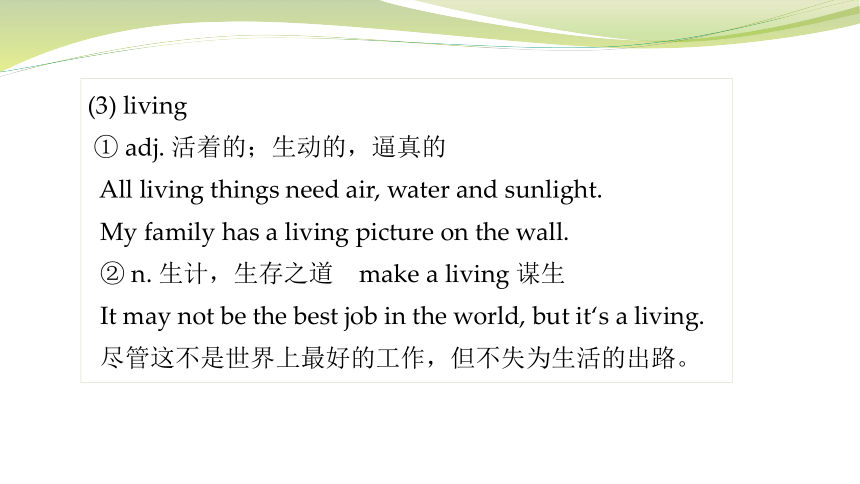
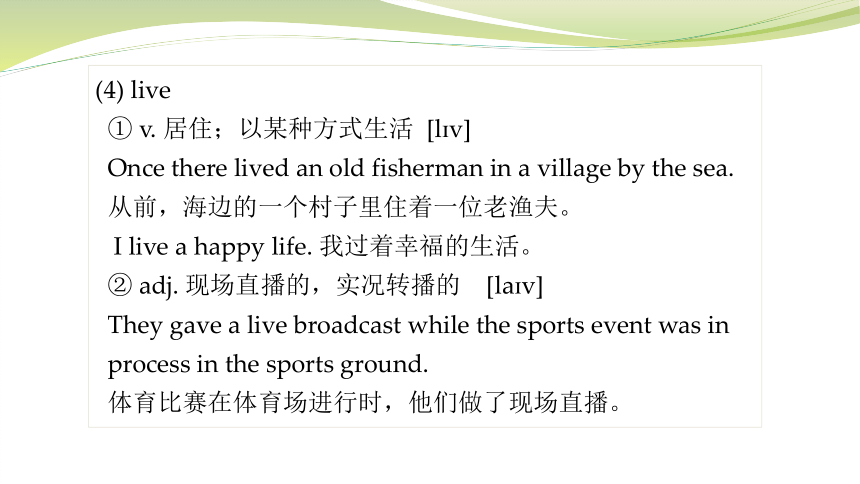
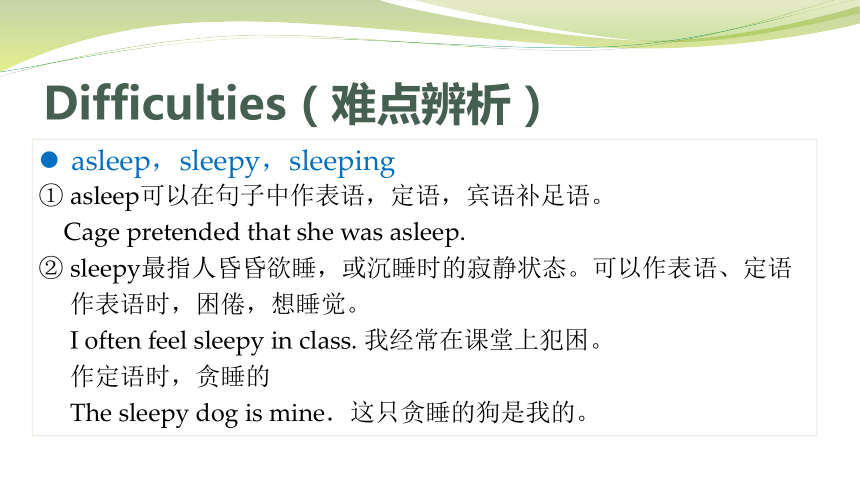
文档简介
(共39张PPT)
八上 Unit 8语言要点和语法拓展
Words (高频词汇)
mind
1. n. 思想,精神,理智
表示“感知﹑ 思维和感觉的能力; 心智”意思是不可数名词;表示“智力”“记忆(力)”是可数名词;也可表示“有才智的人”(可数名词)。
_____________ think alike. 英雄所见略同。
Concentrate your mind on study. Don't look around.
集中精力学习,不要东张西望。
Great minds
2. 用作动词时,mind主要有下列意思:
(1) vt. 注意;留心
Mind your intonation when you speak.你说话时要注意语调。
If you don't mind, you'll be hurt. 如果你不小心,你会受伤的。
(2) vt. 介意;反对
作此用法时,mind通常用于疑问句、否定句或条件句中,后接名词、动名词或从句。
I don't ______________, but this is going too far.
我并不介意开玩笑,但这玩笑太过分了。
mind a joke
Do you mind if I open the window?
= Do you mind _________________________?
你介意我打开窗户吗?
(3) vt. 专心于;从事
__________________________. 管好你自己的事情。
(4) vt. 照看;照料
She asked her daughter to stay at home and _______________.
她叫女儿待在家里照看婴儿。
Don't mind me, I'll be all right soon.
别管我,我一会儿就会好的。
my opening the window
Mind your own businesss
mind the baby
【知识拓展】
change one's mind 改变主意
make up one's mind (to do sth) 下决心(做某事)
keep ... in mind 记住……
have ... on one's mind 挂在心上;惦念
Never mind. 不要紧。
shake
1. n. 摇动,震动
基本意思是“摇动”,也可表示“震动,颠簸”,是可数名词,一般与 a 连用shake还可表示“哆嗦,发颤”,常用复数形式shakes,其前加定冠词the。
He refused with _____________________.他摇了摇头表示拒绝。
I gave ________________, and a coin fell out.
我摇了一下钱包, 掉出一枚硬币。
a shake of the head
my purse a shake
(2) vi. & vt. 摇动,震动
基本意思是“(使) 急速摇动或颠簸”,既可用作及物动词,也可用作不及物动词。作不及物动词,可表示“发抖,打战,发颤”;作及物动词时,还可表示“动摇”某人的想法、信念、信仰等。
__________________ when a train goes by. 火车一经过房子就抖动。
__________________ before taking the medicine.
服药前先将药瓶摇一摇。
Shake the bottle
The house shakes
【知识拓展】
① shake off 逃脱,摆脱
The dog flew at me, but I shook it off.
② shake hands with sb. 和某人握手
Chinese meet those important people by shaking hands with them.
Difficulties(难点辨析)
alive,lively,living,live
(1) alive adj. 在句子中可以作定语,表语,宾语补足语。
I told myself to calm down since I was still alive.
既然我还活着,我告诉自己要镇定。
(2) lively adj. 充满活力的,活泼的,轻快的
She is a lively girl. 她是一位活泼的姑娘。(用作定语)
He may be eighty, but he is still lively.
他可能已有八十岁,但是仍然充满朝气。 (用作表语)
(3) living
① adj. 活着的;生动的,逼真的
All living things need air, water and sunlight.
My family has a living picture on the wall.
② n. 生计,生存之道 make a living 谋生
It may not be the best job in the world, but it‘s a living.
尽管这不是世界上最好的工作,但不失为生活的出路。
(4) live
① v.?居住;以某种方式生活 [l?v]
Once there lived an old fisherman in a village by the sea.
从前,海边的一个村子里住着一位老渔夫。
I live a happy life. 我过着幸福的生活。
② adj. 现场直播的,实况转播的 ?[la?v]
They gave a live broadcast while the sports event was in
process in the sports ground.
体育比赛在体育场进行时,他们做了现场直播。
asleep,sleepy,sleeping
① asleep可以在句子中作表语,定语,宾语补足语。
Cage pretended that she was asleep.
② sleepy最指人昏昏欲睡,或沉睡时的寂静状态。可以作表语、定语
作表语时,困倦,想睡觉。
I often feel sleepy in class. 我经常在课堂上犯困。
作定语时,贪睡的
The sleepy dog is mine.这只贪睡的狗是我的。
Difficulties(难点辨析)
③ sleeping 是定语形容词,它放在它所修饰的名词之前。
Who is that sleeping baby?
sleeping bags 睡袋
注意:sleeping 放在be动词之后,不是形容词,而是sleep的现在进行时。
That old man is sleeping in the bench of the park.
Exercises Fill in the blanks with the proper words given.
1. _________ hands with others can show your kindness.
2. Would you ________ telling me what you're doing here?
3. Don't wake her up she's sound ________.
4. The children didn't talk and had dinner in _________.
5. Tom went off in the ___________ of the post office.
6. As a saying goes, “actions speak __________ than words.”
7. Mum _________ the milk up on the table with a towel.
8. It was a really bad accident - they're lucky to be _______.
live mop loud direct sleep shake silent mind
Shaking
mind
asleep
silence
direction
louder
mopped
alive
( )1. I don't?mind?_______ scared, so I've made up my?mind?______
the horror film.
A. feeling; to watch B. feeling; watching
C. to feel; to watch D. to feel; watching
( )2. —?Do the dishes, Mike, or I will tell mum!
—?_______, Sue!
A.?You are welcome B.?Mind?your own business
C.?It's my duty D. Never?mind
( )3. In China, people are supposed to ______ instead of_____.
A. shaking hands; bow B. shaking hands; bowing???????????? ?????
C. shake hands; bow D. shake hands; bowing
A
B
D
Exercises Choose the corrct answer.
( )4. Jin?Yong is?one of the greatest?and?oldest _______ writers.
He is still ______.
A. living;?alive B. living; living
C.?alive; living D.?alive;?alive
( )5. When the earthquake hit the country, lots of houses ______.
A. broke down B. came down
C. went down D. calmed down
( )6. The floor is so clean. Who ______ this morning?
A. mopped up it B. mopped it up
C. mop up it D. mops it up
A
B
B
Phrases(短语归纳)
1.把水拖干 mop up the water
2.成千上万人 thousands of people
3.冲走村庄 wash away the village
4.着火 catch fire
5.恐惧地尖叫 scream in fear
6.四处逃散 run in all directions
7.坍塌 come down
8.被困在黑暗的地方 be trapped in a dark place
9.在我的头脑中闪过 go through my mind
10. 冷静下来 calm down
11.大喊救命 shout for help
12.找到出路 find one’s way out
13.跑出大楼 run out of the building
14.损坏,出故障 break down
15.尽快 as soon as possible
16.保护自己免受交通事故protect oneself from traffic accidents
17.遵守交通规则 follow traffic rules
18.远离窗户 stay away from a window
19.几乎跌倒 nearly fall over
20. 清除街上的雪 clear the snow from the streets
Exercises Fill in the blanks with the given phrases.
1. Please write back to me ___________________.
2. ____________________ lost their lives in the earthquake.
3. It's said that dry wood _____________ easily.
4. We should ________________ to protect ourselves from accidents.
5. Amy ______________ while she was walking towards the bus stop.
6. Timmy was ____________________ after the noise and shaking ended.
7. The old man couldn't ________________ in the park and got lost.
8. The cleaners were busy _______________________________.
as soon as possible
Thousands of people
catches fire
follow traffic rules
nearly fell over
trapped in a dark place
find his way out
clearing the snow from the streets
Sentences(重点句型)
I could not see anything at all, and I did not know if anyone else was near me.
我根本什么也看不到,而且我不知道我附近是否有其他人。
not…at all意为“根本不,一点也不”。如:
I am not busy at all today. 今天我一点儿也不忙。
not at all还可以用于以下情况:
(1)用于回答感谢,意为“不用谢;不客气”。如:
— Thank you very much多谢你了。
— Not at all.不客气。
(2)用于回答带有感谢性质的客套话,意为“没什么;哪里哪里”。如:
— You are very kind.你真好。
— Not at all.哪里,哪里。
(3)用于回答道歉,意为“没关系”。如:
— I'm sorry I'm late.
对不起,我迟到了。
— Oh, not at all, please come in.
噢,没关系,请进来。
注意辨析:
Who will mop up the water up if I go home without you?
I did not know if anyone else was near me.
前一句是:_______________
后一句是:_______________
—I want to know if Mr Green ______ here tomorrow.
—If he _______, I’ll tell you.
A. comes, comes B. will come, will come
C. will come, comes D. comes, will come
条件状语从句
宾语从句
典型例题
Sandy,I saw you and your parents standing on the side of the road.(P97)
句中用了see sb.doing sth.的结构,意为“看到某人正在做某事”.强调看到的动作正在进行。如:
On my way to school I saw some boys playing in the park.
在我上学的路上,我看见几个男孩在公园里玩。
When I passed the classroom,I heard a girl singing in it.
当我经过教室时,我听到有个女孩在里面唱歌。
注意:see sb.do sth.表示“看到某人做某事”.强调看到的是动作自始至终的全过程或该动作经常发生。如:
I saw an old man fall over on the road just now.
刚才我看见一个老人摔倒了。
I often see some old men play chess under that tree.
我经常看见几个老人在那棵树下下象棋。
用法类似的词还有:hear.smell,feel,watch等。如:
I heard him playing the piano. 我听到他正在弹钢琴。
I often hear the boy sing this English song.
我经常听到这个男孩唱这首英文歌曲。
I often notice the boy ________(offer) a helping hand to others.
I saw him __________(help) a blind person to cross the road when
I went home.
offer
helping
典型例题
Try to get out as soon as possible.(P99)
句中的短语as…as possible意为“尽可能……”,也可表达成as…as __________,根据需要,在两个as之间使用不同的形容词或副词。as soon as possible可解释为very soon,意为“尽快”。也可以说成:___________________。
Please give me ________________________________.
请尽可能地告诉我更多的信息。
Please go over your lessons __________________. 请尽可能经常复习功课。
The boys ran to the finishing line _____________________________.
男孩们尽可能快得向终点跑去。
as much information as possible
as often as possible
典型例题
as fast as possible/they could
Grammar(语法解析)
1.定义
过去进行时表示过去某一时刻正在进行的动作或过去某一段时问一直在进行的动作。如:
I was doing my homework at 8 p. m. last night. 昨晚8点我正在做家庭作业。
What were you doing at this time yesterday? 昨天这个时候你在做什么?
2.构成
过去进行时由“助动词be的过去式was/were+现在分词”构成。如:
The boy was cleaning the house.那个男孩正在打扫房子。
They were playing football at four yesterday afternoon.
昨天下午四点他们在踢足球。
3. 常用时间状语:at that time/moment, (at) this time yesterday (last night/Sunday/week...), at+点钟+yesterday (last night / Sunday...)
4. 句式变化
(1)一般疑问句及回答
变成一般疑问句时应将was或were移到句首。如:
—Was it raining at 6 o'clock this morning?
今天早上六点钟天正在下雨吗?
—Yes, it was./No, it wasn't. 是的。/不是。
—Were they building a dam last winter?
去年冬天他们在建大坝吗?
—Yes,they were. /No,they weren't.
是的,他们在建。/不,他们没有。
(2)否定句
肯定句变成否定句时在was/were后加not,was not常缩写为wasn't,were not常缩写为weren't。如:
My brother was not/wasn't playing computer game last night.
昨天晚上我弟弟不在玩电脑游戏。
We were not/weren't shopping at this time yesterday.
昨天这个时候我们不在购物。
4.用法
(1)表示过去某一时刻正在进行的动作。动作发生的特定时间常用一个时间短语或时间状语从句来表明。如:
I first met Lisa three years ago.She was working at a radio shop at that time.我三年前第一次遇见丽莎。那时,她在一家无线电用品商店工作。
I was drawing a horse when the teacher came in.
老师进来时,我正在画马。
(2)表示过去某一段时间一直在进行的动作。如:
My father was watching TV from seven to eight last night.
昨天晚上七点到八点我爸爸在看电视。
I was living in my teacher's house when I was in middle school.
上中学时,我一直住在老师家里。
when,while和as的用法
1.when,while和as这三个词均有“当……时候”的意思,而且都可以引导时间状语从句。when和as既可以指某一点时间,也可以指某一段时间,其从句中的谓语动词表示的动作既可以是瞬间性的,也可以是延续性的;
while只指一段时间,从句中的谓语动词必须是延续性的。即:指一段时间时,when、while和as都可用;指某一点时间时,只能用when或as,不能用while。如:
When/As he woke up,it was eight o'clock.他醒来的时候,时间是八点钟。
When/As/While 1 was waiting for a bus,I met her.我在等公共汽车的时候,遇到了她。
2.when引导的从句的谓语动词动作可以在主句谓语动词动作之前、之后或同时发生;while和as引导的从句的谓语动词动作必须和主句谓语动词动作同时发生。如:
When he finished his homework,he played the computer games for a while.当他完成作业后,他玩了会儿电脑游戏。(finished先发生)
When I got to the museum,the door was closed.
当我到达博物馆时,大门已经关上了。(got to后发生)
While/As I was sleeping,the telephone rang.
当我在睡觉的时候,电话响了。(was sleeping和rang同时发生)
3.强调两个动作同时进行,常用“过去进行时+while+过去进行时”结构。如:
They were rowing boats while we were climbing the hill.
我们在爬山时,他们在划船。
4.强调某个动作发生的时候,另一个动作正在进行,常用“一般过去时+while/when/as+过去进行时”结构。如:
It began to rain heavily while we were having dinner.
我们在吃晚饭时,开始下起大雨。
When/while/As we were reading, a stranger came in.
当我们在看书时,一位陌生人走了进来。(read为延续性动词)
5.强调某个动作正在进行时,另一个动作突然发生,常用“过去进行时+when十一般过去时”结构。如:
I was walking in the street when he called me.
我正在街上走时,他给我打电话了。
总 结
主句 连词 从句
过去进行时 过去进行时
一般过去时 过去进行时
过去进行时 一般过去时
一般过去时 一般过去时
Exercises
1. —Oh, you didn't carry an umbrella with you! Didn't you listen to the
weather report?
—Yes, I did. But it _______ when I left my home.
A. rains B. rained C. wasn't raining D. was raining
2. —Oh, dears! power cut!
—Sorry, I didn't know you ________ the washing machine.
A. are using B. used C. use D. were using
3. —I have to be off right now.
—What a pity! I ________ you could stay a little longer with us.
A. thought B. am thinking C. think D. was thinking
4. —Why were you late for school this morning, Tom?
—I was about to go to school ______ it began to rain.
A. since B. while C. as D. when
5. A football ______ me when I ______ past the football field.
My arm still hurts now.
A. hit; was walking B. was hitting; was walking
C. was hitting; walked D. hit; am walking
6. —Where were you playing football ______?
—On the football field.
A. in the past two hours B. next Monday
C. at 4 yesterday afternoon D. right now
1. A_______ washed the village away.
A. thunder B. snowstorm C. lightning D. flood
2. _______ you are so tired, you'd better have a good rest.
A. Since B. Before C. After D. So
3. His car_______ the bad weather on his way home.
A. broke down because B. broke down because of
C. broke off because D. broke off because of
4. The terrible earthquake hurt ______ people and _____ them got badly hurt.
A. thousands of; two hundreds of B. two hundred; two hundreds
C. thousand of; two hundred of D. thousands of; two hundred of
5. Grandpa Wang wanted to find the kind taxi driver_______.
A. as quick as possible B. as soon as she can
C. as soon as possibly D. as soon as possible
Exercises Choose the correct answer.
Exercises Put the sentences into Chinese.
1. 不要四处乱跑,我们应该使自己镇定下来。
Don't ___________________. We should make ___________________.
2. 大雪过后,工人们正努力清除街上的雪。
The workers ______________________________________ after the heavy snow.
3. 他自言自语,“我能找到出路吗?”
He _________________, “Can I ____________________?”
4. 我的狗不见了,我不知道它现在是不是还活着。
My dog is missing. I don't know ___________________.
5. 由于驾驶员的粗心驾驶,大巴撞到了树上。
The coach ______________________________ the driver's careless driving.
6. 当医生到达时,他的心脏依然跳动。
His heart ______________________________________.
run in all directions
ourselves calm down
were trying to clear snow from/in the street
said to himself
find my way out
if it is still alive now
crashed into the tree because of
was still beating when the doctor arrived
Exercises Find and correct the mistakes. One mistake one line.
We listened to a talk about how to keep ourselves safely from fires, floods, earthquakes and traffic accidents. When a building on fire,
we should try to get out as soon as possibly. Cover your mouth and nose with a wet towel to prevent yourself from thick smoke and stay low to the ground. Never go back into the burnt building. We should get to low ground when there is a flood. Remember that we
shouldn't walk across the flood water. It's best to hide under a strong
desk or table and stay far away from a window when an earthquake
happens. If you want to avoid accidents, you had better to follow
traffic accidents. However, it's dangerous to sit, walk or ride a bike
on railways.
1. _________
2. _________
3. _________
4. _________
5. _________
6. _________
7. _________
8. _________
9. _________
10._________
Thanks for watching.
八上 Unit 8语言要点和语法拓展
Words (高频词汇)
mind
1. n. 思想,精神,理智
表示“感知﹑ 思维和感觉的能力; 心智”意思是不可数名词;表示“智力”“记忆(力)”是可数名词;也可表示“有才智的人”(可数名词)。
_____________ think alike. 英雄所见略同。
Concentrate your mind on study. Don't look around.
集中精力学习,不要东张西望。
Great minds
2. 用作动词时,mind主要有下列意思:
(1) vt. 注意;留心
Mind your intonation when you speak.你说话时要注意语调。
If you don't mind, you'll be hurt. 如果你不小心,你会受伤的。
(2) vt. 介意;反对
作此用法时,mind通常用于疑问句、否定句或条件句中,后接名词、动名词或从句。
I don't ______________, but this is going too far.
我并不介意开玩笑,但这玩笑太过分了。
mind a joke
Do you mind if I open the window?
= Do you mind _________________________?
你介意我打开窗户吗?
(3) vt. 专心于;从事
__________________________. 管好你自己的事情。
(4) vt. 照看;照料
She asked her daughter to stay at home and _______________.
她叫女儿待在家里照看婴儿。
Don't mind me, I'll be all right soon.
别管我,我一会儿就会好的。
my opening the window
Mind your own businesss
mind the baby
【知识拓展】
change one's mind 改变主意
make up one's mind (to do sth) 下决心(做某事)
keep ... in mind 记住……
have ... on one's mind 挂在心上;惦念
Never mind. 不要紧。
shake
1. n. 摇动,震动
基本意思是“摇动”,也可表示“震动,颠簸”,是可数名词,一般与 a 连用shake还可表示“哆嗦,发颤”,常用复数形式shakes,其前加定冠词the。
He refused with _____________________.他摇了摇头表示拒绝。
I gave ________________, and a coin fell out.
我摇了一下钱包, 掉出一枚硬币。
a shake of the head
my purse a shake
(2) vi. & vt. 摇动,震动
基本意思是“(使) 急速摇动或颠簸”,既可用作及物动词,也可用作不及物动词。作不及物动词,可表示“发抖,打战,发颤”;作及物动词时,还可表示“动摇”某人的想法、信念、信仰等。
__________________ when a train goes by. 火车一经过房子就抖动。
__________________ before taking the medicine.
服药前先将药瓶摇一摇。
Shake the bottle
The house shakes
【知识拓展】
① shake off 逃脱,摆脱
The dog flew at me, but I shook it off.
② shake hands with sb. 和某人握手
Chinese meet those important people by shaking hands with them.
Difficulties(难点辨析)
alive,lively,living,live
(1) alive adj. 在句子中可以作定语,表语,宾语补足语。
I told myself to calm down since I was still alive.
既然我还活着,我告诉自己要镇定。
(2) lively adj. 充满活力的,活泼的,轻快的
She is a lively girl. 她是一位活泼的姑娘。(用作定语)
He may be eighty, but he is still lively.
他可能已有八十岁,但是仍然充满朝气。 (用作表语)
(3) living
① adj. 活着的;生动的,逼真的
All living things need air, water and sunlight.
My family has a living picture on the wall.
② n. 生计,生存之道 make a living 谋生
It may not be the best job in the world, but it‘s a living.
尽管这不是世界上最好的工作,但不失为生活的出路。
(4) live
① v.?居住;以某种方式生活 [l?v]
Once there lived an old fisherman in a village by the sea.
从前,海边的一个村子里住着一位老渔夫。
I live a happy life. 我过着幸福的生活。
② adj. 现场直播的,实况转播的 ?[la?v]
They gave a live broadcast while the sports event was in
process in the sports ground.
体育比赛在体育场进行时,他们做了现场直播。
asleep,sleepy,sleeping
① asleep可以在句子中作表语,定语,宾语补足语。
Cage pretended that she was asleep.
② sleepy最指人昏昏欲睡,或沉睡时的寂静状态。可以作表语、定语
作表语时,困倦,想睡觉。
I often feel sleepy in class. 我经常在课堂上犯困。
作定语时,贪睡的
The sleepy dog is mine.这只贪睡的狗是我的。
Difficulties(难点辨析)
③ sleeping 是定语形容词,它放在它所修饰的名词之前。
Who is that sleeping baby?
sleeping bags 睡袋
注意:sleeping 放在be动词之后,不是形容词,而是sleep的现在进行时。
That old man is sleeping in the bench of the park.
Exercises Fill in the blanks with the proper words given.
1. _________ hands with others can show your kindness.
2. Would you ________ telling me what you're doing here?
3. Don't wake her up she's sound ________.
4. The children didn't talk and had dinner in _________.
5. Tom went off in the ___________ of the post office.
6. As a saying goes, “actions speak __________ than words.”
7. Mum _________ the milk up on the table with a towel.
8. It was a really bad accident - they're lucky to be _______.
live mop loud direct sleep shake silent mind
Shaking
mind
asleep
silence
direction
louder
mopped
alive
( )1. I don't?mind?_______ scared, so I've made up my?mind?______
the horror film.
A. feeling; to watch B. feeling; watching
C. to feel; to watch D. to feel; watching
( )2. —?Do the dishes, Mike, or I will tell mum!
—?_______, Sue!
A.?You are welcome B.?Mind?your own business
C.?It's my duty D. Never?mind
( )3. In China, people are supposed to ______ instead of_____.
A. shaking hands; bow B. shaking hands; bowing???????????? ?????
C. shake hands; bow D. shake hands; bowing
A
B
D
Exercises Choose the corrct answer.
( )4. Jin?Yong is?one of the greatest?and?oldest _______ writers.
He is still ______.
A. living;?alive B. living; living
C.?alive; living D.?alive;?alive
( )5. When the earthquake hit the country, lots of houses ______.
A. broke down B. came down
C. went down D. calmed down
( )6. The floor is so clean. Who ______ this morning?
A. mopped up it B. mopped it up
C. mop up it D. mops it up
A
B
B
Phrases(短语归纳)
1.把水拖干 mop up the water
2.成千上万人 thousands of people
3.冲走村庄 wash away the village
4.着火 catch fire
5.恐惧地尖叫 scream in fear
6.四处逃散 run in all directions
7.坍塌 come down
8.被困在黑暗的地方 be trapped in a dark place
9.在我的头脑中闪过 go through my mind
10. 冷静下来 calm down
11.大喊救命 shout for help
12.找到出路 find one’s way out
13.跑出大楼 run out of the building
14.损坏,出故障 break down
15.尽快 as soon as possible
16.保护自己免受交通事故protect oneself from traffic accidents
17.遵守交通规则 follow traffic rules
18.远离窗户 stay away from a window
19.几乎跌倒 nearly fall over
20. 清除街上的雪 clear the snow from the streets
Exercises Fill in the blanks with the given phrases.
1. Please write back to me ___________________.
2. ____________________ lost their lives in the earthquake.
3. It's said that dry wood _____________ easily.
4. We should ________________ to protect ourselves from accidents.
5. Amy ______________ while she was walking towards the bus stop.
6. Timmy was ____________________ after the noise and shaking ended.
7. The old man couldn't ________________ in the park and got lost.
8. The cleaners were busy _______________________________.
as soon as possible
Thousands of people
catches fire
follow traffic rules
nearly fell over
trapped in a dark place
find his way out
clearing the snow from the streets
Sentences(重点句型)
I could not see anything at all, and I did not know if anyone else was near me.
我根本什么也看不到,而且我不知道我附近是否有其他人。
not…at all意为“根本不,一点也不”。如:
I am not busy at all today. 今天我一点儿也不忙。
not at all还可以用于以下情况:
(1)用于回答感谢,意为“不用谢;不客气”。如:
— Thank you very much多谢你了。
— Not at all.不客气。
(2)用于回答带有感谢性质的客套话,意为“没什么;哪里哪里”。如:
— You are very kind.你真好。
— Not at all.哪里,哪里。
(3)用于回答道歉,意为“没关系”。如:
— I'm sorry I'm late.
对不起,我迟到了。
— Oh, not at all, please come in.
噢,没关系,请进来。
注意辨析:
Who will mop up the water up if I go home without you?
I did not know if anyone else was near me.
前一句是:_______________
后一句是:_______________
—I want to know if Mr Green ______ here tomorrow.
—If he _______, I’ll tell you.
A. comes, comes B. will come, will come
C. will come, comes D. comes, will come
条件状语从句
宾语从句
典型例题
Sandy,I saw you and your parents standing on the side of the road.(P97)
句中用了see sb.doing sth.的结构,意为“看到某人正在做某事”.强调看到的动作正在进行。如:
On my way to school I saw some boys playing in the park.
在我上学的路上,我看见几个男孩在公园里玩。
When I passed the classroom,I heard a girl singing in it.
当我经过教室时,我听到有个女孩在里面唱歌。
注意:see sb.do sth.表示“看到某人做某事”.强调看到的是动作自始至终的全过程或该动作经常发生。如:
I saw an old man fall over on the road just now.
刚才我看见一个老人摔倒了。
I often see some old men play chess under that tree.
我经常看见几个老人在那棵树下下象棋。
用法类似的词还有:hear.smell,feel,watch等。如:
I heard him playing the piano. 我听到他正在弹钢琴。
I often hear the boy sing this English song.
我经常听到这个男孩唱这首英文歌曲。
I often notice the boy ________(offer) a helping hand to others.
I saw him __________(help) a blind person to cross the road when
I went home.
offer
helping
典型例题
Try to get out as soon as possible.(P99)
句中的短语as…as possible意为“尽可能……”,也可表达成as…as __________,根据需要,在两个as之间使用不同的形容词或副词。as soon as possible可解释为very soon,意为“尽快”。也可以说成:___________________。
Please give me ________________________________.
请尽可能地告诉我更多的信息。
Please go over your lessons __________________. 请尽可能经常复习功课。
The boys ran to the finishing line _____________________________.
男孩们尽可能快得向终点跑去。
as much information as possible
as often as possible
典型例题
as fast as possible/they could
Grammar(语法解析)
1.定义
过去进行时表示过去某一时刻正在进行的动作或过去某一段时问一直在进行的动作。如:
I was doing my homework at 8 p. m. last night. 昨晚8点我正在做家庭作业。
What were you doing at this time yesterday? 昨天这个时候你在做什么?
2.构成
过去进行时由“助动词be的过去式was/were+现在分词”构成。如:
The boy was cleaning the house.那个男孩正在打扫房子。
They were playing football at four yesterday afternoon.
昨天下午四点他们在踢足球。
3. 常用时间状语:at that time/moment, (at) this time yesterday (last night/Sunday/week...), at+点钟+yesterday (last night / Sunday...)
4. 句式变化
(1)一般疑问句及回答
变成一般疑问句时应将was或were移到句首。如:
—Was it raining at 6 o'clock this morning?
今天早上六点钟天正在下雨吗?
—Yes, it was./No, it wasn't. 是的。/不是。
—Were they building a dam last winter?
去年冬天他们在建大坝吗?
—Yes,they were. /No,they weren't.
是的,他们在建。/不,他们没有。
(2)否定句
肯定句变成否定句时在was/were后加not,was not常缩写为wasn't,were not常缩写为weren't。如:
My brother was not/wasn't playing computer game last night.
昨天晚上我弟弟不在玩电脑游戏。
We were not/weren't shopping at this time yesterday.
昨天这个时候我们不在购物。
4.用法
(1)表示过去某一时刻正在进行的动作。动作发生的特定时间常用一个时间短语或时间状语从句来表明。如:
I first met Lisa three years ago.She was working at a radio shop at that time.我三年前第一次遇见丽莎。那时,她在一家无线电用品商店工作。
I was drawing a horse when the teacher came in.
老师进来时,我正在画马。
(2)表示过去某一段时间一直在进行的动作。如:
My father was watching TV from seven to eight last night.
昨天晚上七点到八点我爸爸在看电视。
I was living in my teacher's house when I was in middle school.
上中学时,我一直住在老师家里。
when,while和as的用法
1.when,while和as这三个词均有“当……时候”的意思,而且都可以引导时间状语从句。when和as既可以指某一点时间,也可以指某一段时间,其从句中的谓语动词表示的动作既可以是瞬间性的,也可以是延续性的;
while只指一段时间,从句中的谓语动词必须是延续性的。即:指一段时间时,when、while和as都可用;指某一点时间时,只能用when或as,不能用while。如:
When/As he woke up,it was eight o'clock.他醒来的时候,时间是八点钟。
When/As/While 1 was waiting for a bus,I met her.我在等公共汽车的时候,遇到了她。
2.when引导的从句的谓语动词动作可以在主句谓语动词动作之前、之后或同时发生;while和as引导的从句的谓语动词动作必须和主句谓语动词动作同时发生。如:
When he finished his homework,he played the computer games for a while.当他完成作业后,他玩了会儿电脑游戏。(finished先发生)
When I got to the museum,the door was closed.
当我到达博物馆时,大门已经关上了。(got to后发生)
While/As I was sleeping,the telephone rang.
当我在睡觉的时候,电话响了。(was sleeping和rang同时发生)
3.强调两个动作同时进行,常用“过去进行时+while+过去进行时”结构。如:
They were rowing boats while we were climbing the hill.
我们在爬山时,他们在划船。
4.强调某个动作发生的时候,另一个动作正在进行,常用“一般过去时+while/when/as+过去进行时”结构。如:
It began to rain heavily while we were having dinner.
我们在吃晚饭时,开始下起大雨。
When/while/As we were reading, a stranger came in.
当我们在看书时,一位陌生人走了进来。(read为延续性动词)
5.强调某个动作正在进行时,另一个动作突然发生,常用“过去进行时+when十一般过去时”结构。如:
I was walking in the street when he called me.
我正在街上走时,他给我打电话了。
总 结
主句 连词 从句
过去进行时 过去进行时
一般过去时 过去进行时
过去进行时 一般过去时
一般过去时 一般过去时
Exercises
1. —Oh, you didn't carry an umbrella with you! Didn't you listen to the
weather report?
—Yes, I did. But it _______ when I left my home.
A. rains B. rained C. wasn't raining D. was raining
2. —Oh, dears! power cut!
—Sorry, I didn't know you ________ the washing machine.
A. are using B. used C. use D. were using
3. —I have to be off right now.
—What a pity! I ________ you could stay a little longer with us.
A. thought B. am thinking C. think D. was thinking
4. —Why were you late for school this morning, Tom?
—I was about to go to school ______ it began to rain.
A. since B. while C. as D. when
5. A football ______ me when I ______ past the football field.
My arm still hurts now.
A. hit; was walking B. was hitting; was walking
C. was hitting; walked D. hit; am walking
6. —Where were you playing football ______?
—On the football field.
A. in the past two hours B. next Monday
C. at 4 yesterday afternoon D. right now
1. A_______ washed the village away.
A. thunder B. snowstorm C. lightning D. flood
2. _______ you are so tired, you'd better have a good rest.
A. Since B. Before C. After D. So
3. His car_______ the bad weather on his way home.
A. broke down because B. broke down because of
C. broke off because D. broke off because of
4. The terrible earthquake hurt ______ people and _____ them got badly hurt.
A. thousands of; two hundreds of B. two hundred; two hundreds
C. thousand of; two hundred of D. thousands of; two hundred of
5. Grandpa Wang wanted to find the kind taxi driver_______.
A. as quick as possible B. as soon as she can
C. as soon as possibly D. as soon as possible
Exercises Choose the correct answer.
Exercises Put the sentences into Chinese.
1. 不要四处乱跑,我们应该使自己镇定下来。
Don't ___________________. We should make ___________________.
2. 大雪过后,工人们正努力清除街上的雪。
The workers ______________________________________ after the heavy snow.
3. 他自言自语,“我能找到出路吗?”
He _________________, “Can I ____________________?”
4. 我的狗不见了,我不知道它现在是不是还活着。
My dog is missing. I don't know ___________________.
5. 由于驾驶员的粗心驾驶,大巴撞到了树上。
The coach ______________________________ the driver's careless driving.
6. 当医生到达时,他的心脏依然跳动。
His heart ______________________________________.
run in all directions
ourselves calm down
were trying to clear snow from/in the street
said to himself
find my way out
if it is still alive now
crashed into the tree because of
was still beating when the doctor arrived
Exercises Find and correct the mistakes. One mistake one line.
We listened to a talk about how to keep ourselves safely from fires, floods, earthquakes and traffic accidents. When a building on fire,
we should try to get out as soon as possibly. Cover your mouth and nose with a wet towel to prevent yourself from thick smoke and stay low to the ground. Never go back into the burnt building. We should get to low ground when there is a flood. Remember that we
shouldn't walk across the flood water. It's best to hide under a strong
desk or table and stay far away from a window when an earthquake
happens. If you want to avoid accidents, you had better to follow
traffic accidents. However, it's dangerous to sit, walk or ride a bike
on railways.
1. _________
2. _________
3. _________
4. _________
5. _________
6. _________
7. _________
8. _________
9. _________
10._________
Thanks for watching.
